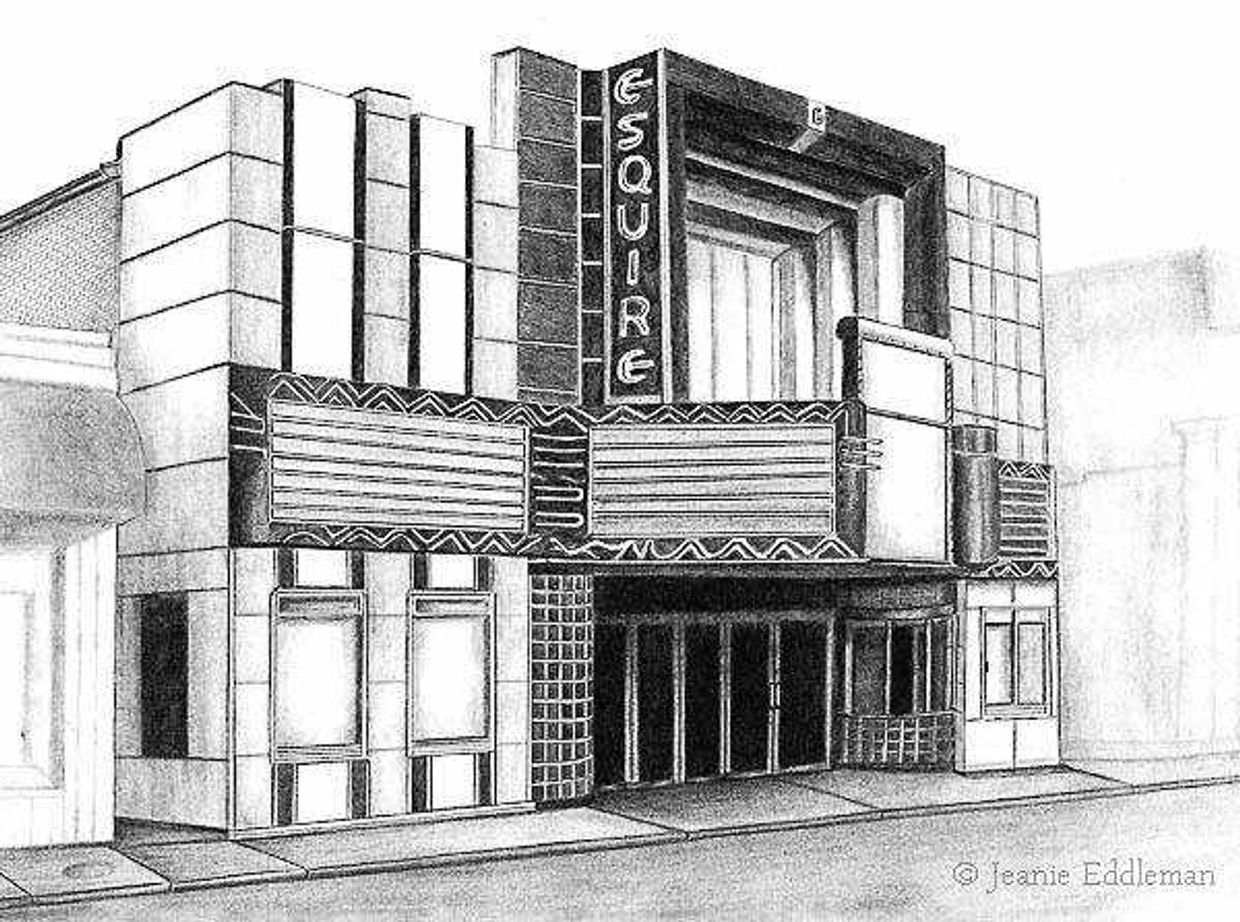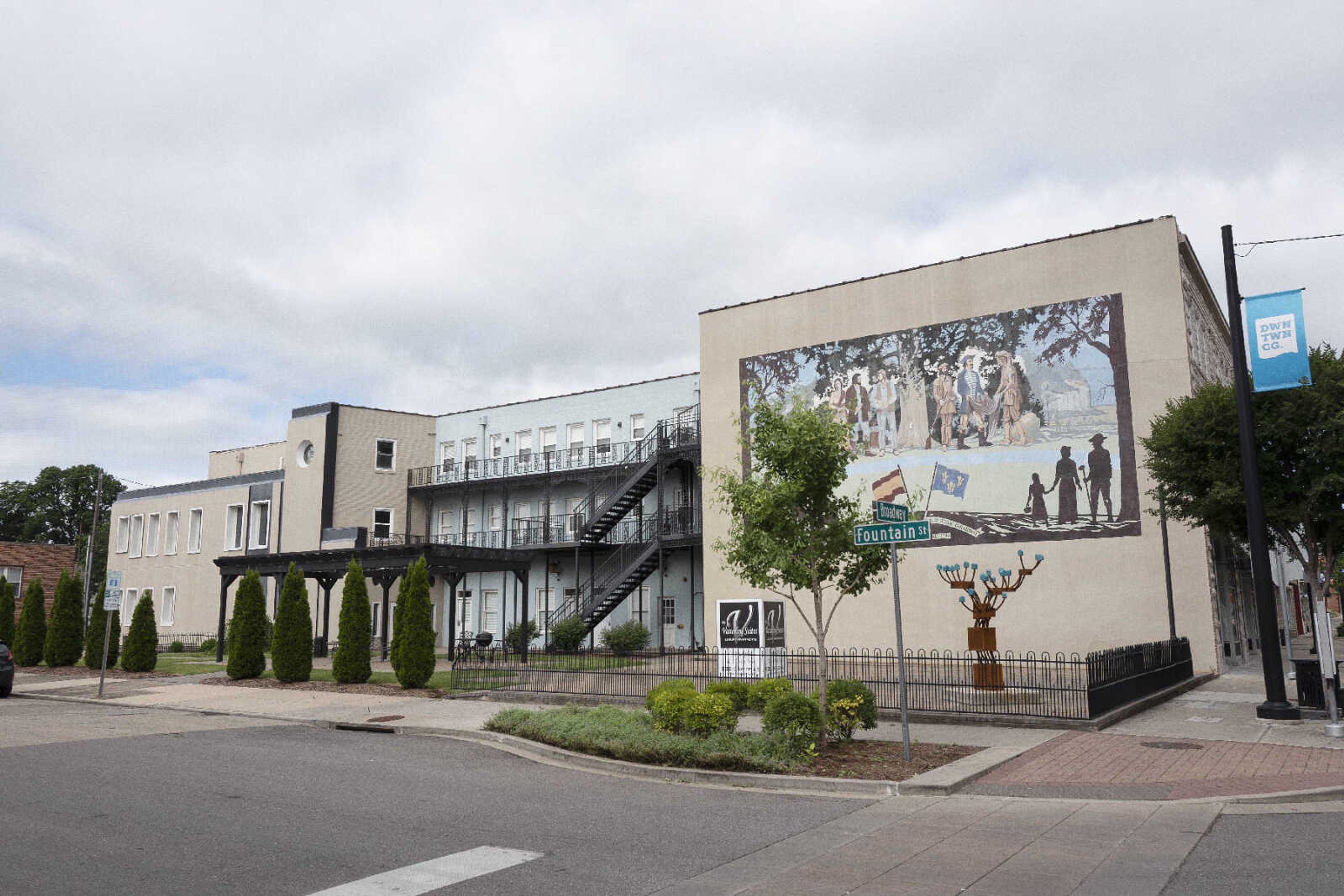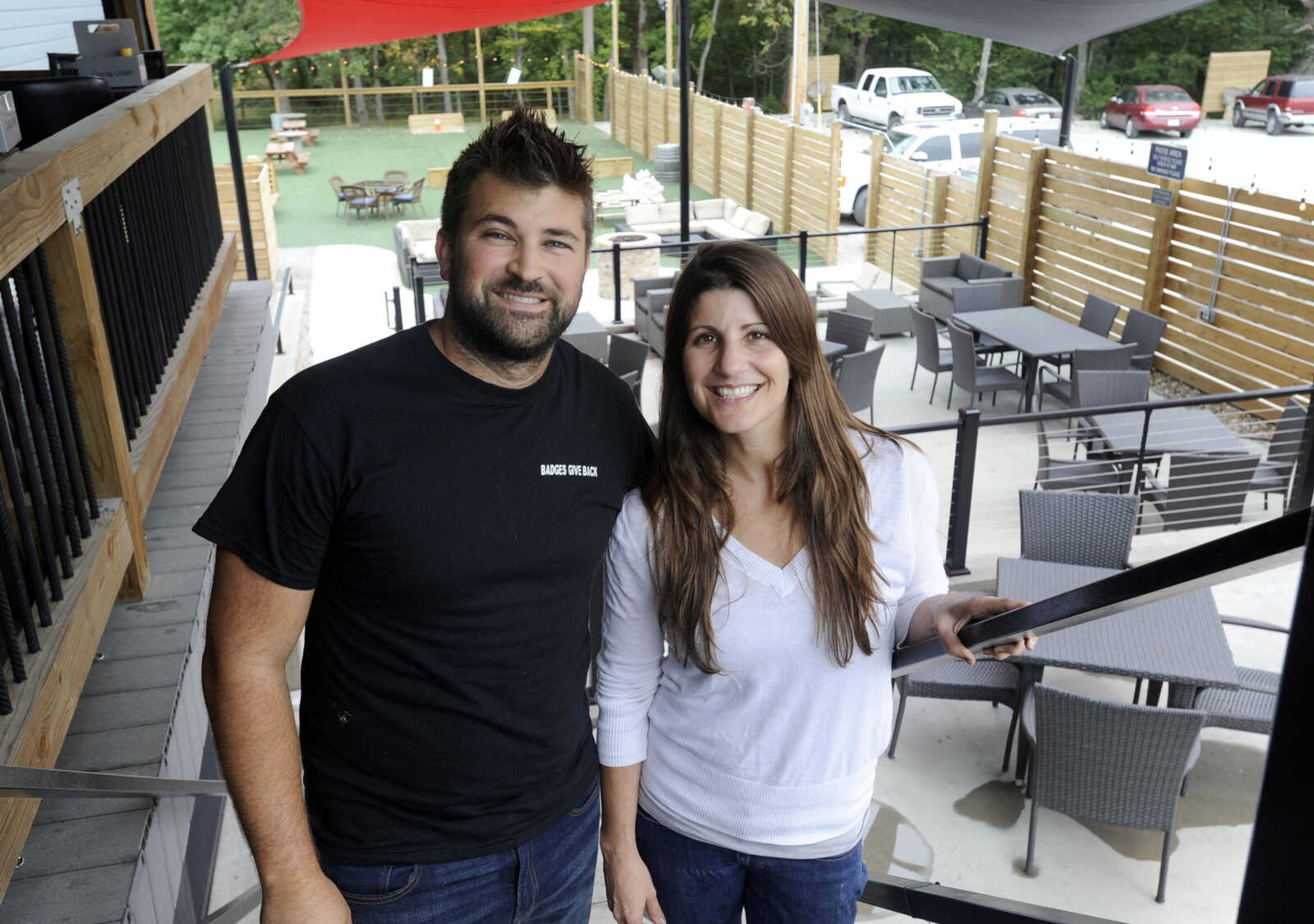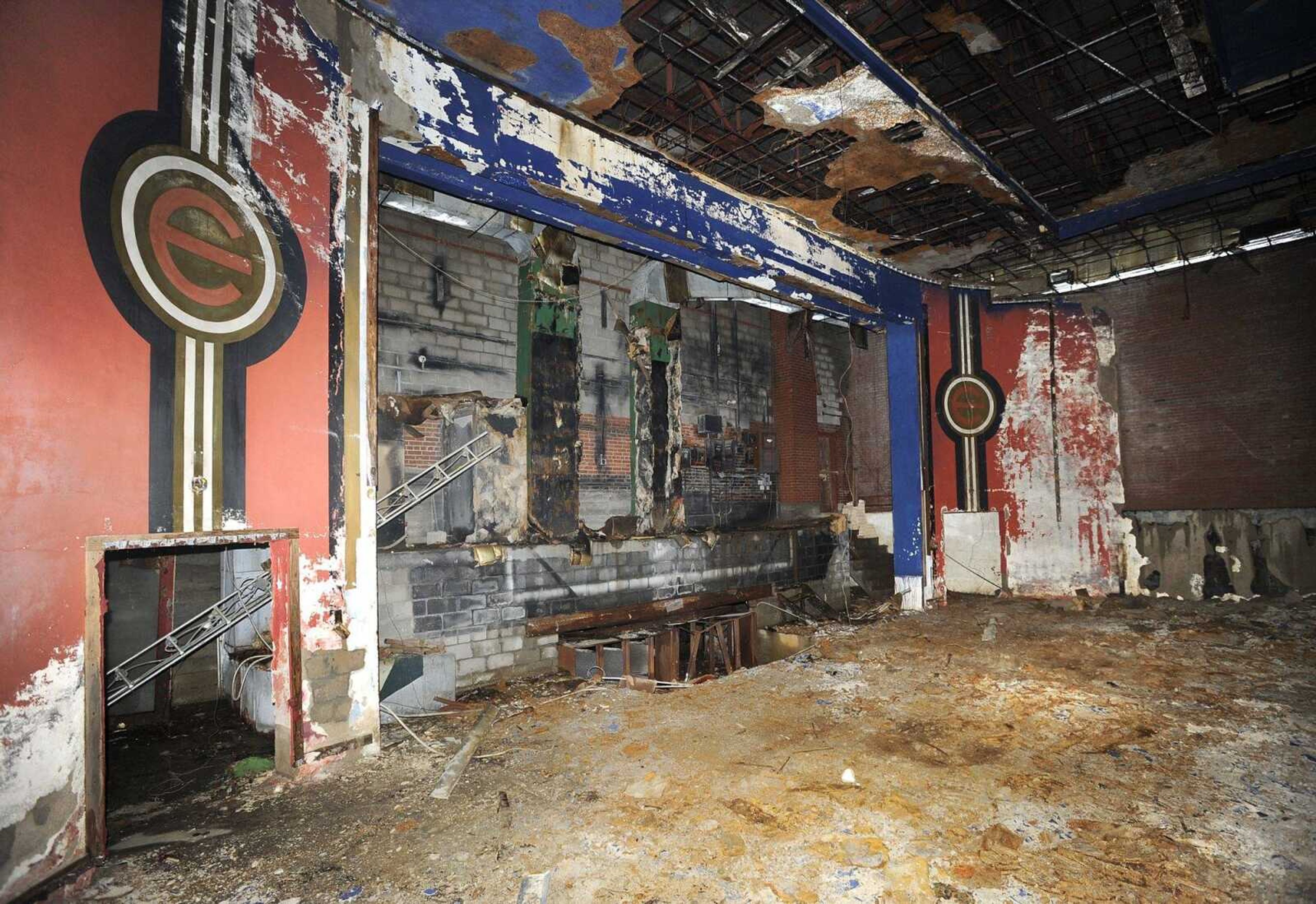Rebirth of an icon?
In Cape Girardeau, the Esquire Theater stands at the entry point to the town's historic downtown. It is a mess with deteriorating infrastructure. Water damage has destroyed much of the inside. For more than 30 years it's been vacant -- with the exception of an occasional church service -- and its building integrity has become worse each year. Nowadays, without major renovation, it would be unsafe for anything to take place inside. Until recently, the building's most likely fate: demolition...
~Esquire Theater in Cape Girardeau poised for redevelopment
In Cape Girardeau, the Esquire Theater stands at the entry point to the town's historic downtown. It is a mess with deteriorating infrastructure. Water damage has destroyed much of the inside. For more than 30 years it's been vacant -- with the exception of an occasional church service -- and its building integrity has become worse each year. Nowadays, without major renovation, it would be unsafe for anything to take place inside. Until recently, the building's most likely fate: demolition.
When it was first built in 1947, though, the Esquire was state-of-the-art: a movie theater where, over the nearly 40 years it operated, thousands of local boys and girls attended their first film, maybe, years later, even sneaking their first kiss. A distinct Art Deco fa�ade with cascading neon lights helped the building serve as an iconic entry to downtown Broadway. Memories of the Esquire's heyday remain bright for many who live in the area, even if the building itself is now largely an eyesore.

Spurred by nostalgia, several developers over the years dreamed about fixing up the old theater, but in the end, their business plans fell apart. Financially, renovating an old theater is usually high risk, low reward.
Marla Mills, executive director of Old Town Cape, a not-for-profit organization focused on revitalizing the city's downtown, told a local tax incentive committee: "Since my first day at Old Town Cape, in 11 years, it's something we've been working on. This doesn't mean people haven't been interested in this. It's that they couldn't develop a plan absent some sort of assistance that would financially work."
To create assistance for just these kinds of historic projects, in 2016, the City of Cape Girardeau formed a downtown Tax Increment Financing (TIF) district, covering about 300 acres in the city's historic riverfront. Five development project areas were established, with the city serving as master developer, approving or denying tax benefits to any specific project. The reason for the establishment of five areas was to give greater flexibility for the initiation of projects, because once a project is approved in an area, a countdown on any TIF project in the same area begins with a maximum of 23 years allowed for tax benefits. Located to the west of the district, however, the Esquire was left out of the plan.
At the time the district was formed, city manager Scott Meyer told the Southeast Missourian newspaper the intention was to spur development of old downtown buildings and prevent erosion of property values. Since then, two of the project areas have been activated, with the approval of a $21 million plan to renovate the old Marquette Hotel into a Tech Office District, along with converting the largely vacant, five-story H&H office building and its long-empty neighbor across the street into a Courtyard by Marriott hotel. Both projects are helping transform the city, reinvigorating three historic downtown buildings without prospects, into anchors of activity and business. The Courtyard by Marriott hotel is scheduled to open in September. Meanwhile, a second downtown TIF area was activated in June 2017 with the approval of a $4.59 million project encompassing two aging buildings at Main and Independence streets. Unexpected obstacles not uncommon with old buildings have prevented that project from launching.
In April, the Cape Girardeau City Council expressed its willingness to apply a TIF to the Esquire and made a request for proposals. The timing wasn't random: a development group had been exploring various plans for several years, and it had already secured an option on the building. In May, the group made its initial presentation to a local TIF commission, which is charged by the City Council with establishing new TIF districts. The next meeting of the commission and a public hearing on the Esquire will be held at the Osage Centre on July 19.
The development team

Leading the effort to revitalize the Esquire is a development group from Bloomsdale, Missouri, a team of two brothers and a sister who largely grew up in the construction business. For those familiar with Cape Girardeau development, this group has quickly made a name for itself. Initially, it was buying, renovating and flipping houses near the university campus. Then, with the help of historic tax credits, they purchased an old apartment building, formerly a hotel, in downtown Cape -- the Vasterling Suites -- and turned it and its 25 housing units into a showpiece for historic redevelopment. A successful bridal shop, Magnolias Bridal Boutique, owned and managed by the wife of one of the brothers, anchors the building's retail space on Broadway. There is no question the family has fallen in love with Cape. To them, the Esquire represents the next step in their progression from projects focused on simply making money, to development centered on historic preservation and enhancement of a community's quality of life.
The person taking the public lead in talking about the Esquire project is Cara Naeger, the eldest of the three siblings.
"While we are located in Bloomsdale," Naeger says, "we have a lot of heart for Cape. We have invested there professionally, and we just really enjoy and love the town. And we have always loved the Esquire building.
"My brother RJ, from the first day we went into Cape, said, 'One day I want to own that,' and that was 11 years ago.
"I didn't get it at first, 'Why would you want to own that? I don't see it,' but my brothers have great, visionary ideas, and they're contractors, so they can see what something can be. I love that.
"We're just a great mix of a team, and we feel like our projects need to have a higher purpose. We're not going to invest in something just because it makes money. When you invest in something that is going to give back to the community, it's just really great. That's why our company is named TAG Development, which means 'Together Always Giving.'"
Besides Naeger, TAG includes her younger brothers RJ and Eric Clements. Naeger explained they are actually a blended family, which treats and jokes with each other like equals. Their father is in the construction business, which exposed them early to development. He also helps in their construction projects and has followed their evolution closely. Cara, RJ and Eric also own a construction company, Clemco Contracting. Lifelong friend Shanna Starnes joined TAG in 2014 as an investor and fourth principal.

The Dew Drop Inn and The Kozy

To understand Cara and her brothers' vision for the Esquire, it helps to stop by the Dew Drop Inn in Bloomsdale, located 70 miles north of Cape Girardeau. Originally built as a flour mill in 1897, the historic location was purchased by the three siblings in 2015. Together, they converted a dark, dingy diner with an unpleasant odor from years of cigarette smoke into a bright, non-smoking, major destination for the area. The building now houses two restaurants: the Dew Drop Inn, which serves a mouthwatering menu created by Cara's husband Judd featuring barbecue, wings, pizza and innovative beverages; and The Kozy, run by her mother Dona, which specializes in country cooking.
To create the ambience they wanted, the development team demolished many of the add-ons that obscured the original building while adding new space in back, built with large windows to let in the sunshine. In 2016, they expanded further by adding venue space in the basement and new outdoor areas for private and public events. One of the new patios includes couches, a bar, firepit and games like a giant Connect 4, chess, cornhole and horseshoes, all played on artificial turf.
Besides being a family destination for food and drink, the Dew Drop Inn has become a popular venue for weddings, live bands, community fundraisers and even touring comedy shows. No weekend goes by without a live band or acoustic musician, and usually, there are several events taking place, according to Naeger. On a busy weekend night, as many as 400 people might be there at once. For example, on June 15, the site featured live music and a benefit for a community member.
"Taking an old building and bringing it back to life and creating a place where the community can create new memories, it's pretty wonderful," Naeger says.
Vision for the Esquire

Parlaying their experience with the Dew Drop, Naeger and team saw an opportunity with the Esquire to create another historic venue for touring bands, weddings and community events. It could also be a site for classic and art films.
"We see a lot of potential for what the Esquire can be, to bring some life to that end of the street," Naeger says. "We want to make it a viable building, where people can really enjoy the experience and the memories."
"When you walk into the building right now, you're faced with a wall," Naeger continues. "Behind that wall is the big open space. We're going to actually remove that wall and create this grand space that you can see as soon as you enter the building. There will be two bars on the side, easy access, and restrooms added to the left. You can go upstairs to the mezzanine, a kind of private VIP lounge, which used to be the projection room. And in front of you, you'll have this nice stage with the Esquire logos on each side. The floor will be tiered into platforms, with the lowest tier like the standing room next to the band. It will all have flexible seating so we can bring in the roundtables for weddings and then take them out.
"There will be offices inside the building, and an area to house the bride, and another area to do the catering. On the outside, we'll be restoring all the beautiful lights, but using LCDs."
Parking has been negotiated with the University and nearby Centenary Church, and new construction for bathrooms will take place in a current green space between the Esquire and University parking. The venue is expected to host a maximum of 650 people.
In its business plan, TAG projects $760,500 in ticket sales a year, figuring an average of 1.5 shows a week (78 for the year), with 60 percent occupancy at an average ticket price of $25. With food, beverage and other revenue added in, total revenue for the concert side of the business is projected to start around $1.29 million annually. Yearly revenue for private events like weddings and business meetings is estimated at $322,500 with the bulk (81.4%) coming from food and beverage sales.
The plan, however, doesn't work without developer incentives, and TAG is applying for multiple sources of assistance: state and federal historic tax credits, Brownsfield Tax Credits and local tax relief.
Central to its effort is Tax Increment Financing (TIF), a state-authorized local development tool that, basically, allows a developer to be reimbursed for a portion of future taxes its activities generate, in order to pay for initial construction. It works by recording the baseline taxes generated by a property before development. This baseline tax revenue continues to flow to taxing entities, just like it would if no development were to take place. Additional tax revenue created by property improvement and new sales, however, is split between the taxing entities and the developer, as negotiated in a development agreement. Observers often think TIFs involve new taxes on consumers or citizens. They don't. It's the type of tool chambers of commerce directors like to point to, if properly utilized, as being low risk for the community.
At the June meeting of the Cape Girardeau TIF commission, Cape Girardeau Chamber of Commerce president John Mehner said, "This building has sat there for 30 years. The greatest thing that can happen for this building is this project. Is it a risky project? Yes. Is it risky to the city? No. Is it risky to the taxpayers? No. Does Cara have a lot of guts? Yes."
Part of the job of the TIF commission is to understand the gap between the developer's plan and viability. Eventually, it will make a recommendation, but specific details will be left to the city to negotiate with TAG, regardless of the commission's findings. Ultimately, though, the project will sink or swim on the developer's execution of its plan.
Preserving History
Not all TIF projects are good ones. Indeed, across the nation, TIFs have developed a negative reputation, largely because of how they've been abused. In too many cases, the incentives have sidestepped intended limitations and been employed to lure major retailers to a specific municipality. Why? Because TIFs -- although they basically forego certain taxes for a period of time -- still generate new taxes for the area and for municipalities; part of something is better than all of nothing. The problem with this strategy, though, is that the competition for attracting new businesses through incentives, wrongly used, can lead to the starving of institutions that rely on taxes to provide services. And, if the new business development requires new services, it puts a further burden on local tax-dependent institutions like cities, schools, libraries, mental health and senior assistance.
The other major criticism is that TIFs don't actually create new jobs or business. All they do is shift existing or otherwise new business from one area to the TIF district, benefiting one developer or group of property owners over another.
The proposed Esquire project, though, checks the most important boxes as being the good kind of TIF, including: addressing a truly blighted, historic building, difficult to develop otherwise.
Meanwhile, if potential competitors to such a live entertainment and rental venue have a problem with the development, so far they've been quiet. But one theory is that the more destination attractions there are in Cape Girardeau, the more people will flock to the city, raising the tide for all boats. College kids, too, would have more reason to stay in Cape Girardeau rather than travelling home on the weekends, as many do, with more than 40 percent of Southeast students coming from the greater St. Louis area. Finally, whether it would be better to tear down the building or build a concert hall somewhere else, that's an easy question for Naeger to answer.
"Gosh, why would you do that? You can't just replace these spaces," she says. "You can't go out to I-55 and build the Esquire. When you tear down stuff like that, you know, you lose a piece of history. Downtown is the heart of Cape Girardeau, and it's important to revitalize it, to make it a place where people just love to come. We cherish that, we value bringing something back, having love for what the people before us created and did."
If the TIF commission approves -- or even if it doesn't -- and a developer's agreement is reached with the city, then TAG could begin renovating the Esquire as early as August. New memories to start: 2019.
---
Jon K. Rust is a contributing writer to B magazine. He previously wrote cases and textbook chapters as a Dean�s Research Fellow at Harvard Business School. He is co-president of Rust Communications and publisher of the Southeast Missourian.
Connect with the Southeast Missourian Newsroom:
For corrections to this story or other insights for the editor, click here. To submit a letter to the editor, click here. To learn about the Southeast Missourian’s AI Policy, click here.







